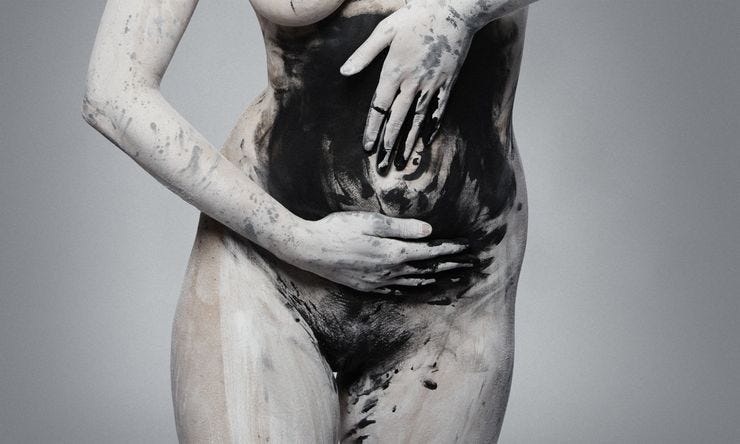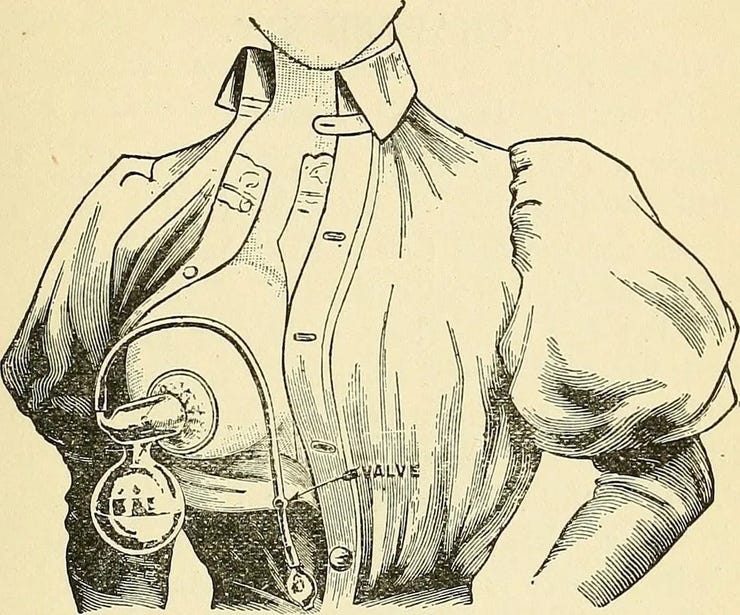Mothers as makers of death

Hello friends,
In this edition, we delve into how creative women have explored the darker aspects of motherhood. Because isn’t it at times a raw, frightening place?
In many ways, we are lucky to live in a time where a lot of taboos around motherhood are being dismantled, and we are becoming more and more open about different facets of the experience.
But I still wasn’t prepared for the dark, invasive thoughts that shook my soul after my son was born. For how I would regularly find myself compulsively imagining worst-case scenarios in even the most mundane of moments.
I've been grateful to find that I'm not alone. Let's get stuck in.
The 'treacherous emotional terrain' of motherhood
Modern literary fiction is starting to borrow from the thriller, horror and even sci-fi genres to explore the darker, more vulnerable and unsettling aspects of becoming a mother.
A great example of this is the critically-acclaimed The Need by Helen Phillips. Here's how the New York Times described it, and this budding new canon:
“The Need belongs to a growing body of surreal speculative fiction that uses horror tropes to capture the panic, self-doubt and pressures that new mothers face. The exhaustion that verges on hallucination. The feeling that your body has become a food source and no longer belongs to you. The endless chores and monotony of caring for small children, punctuated by adrenaline spikes that emanate from a constant, creeping dread. What if the fever in the middle of the night is a sign of a life-threatening illness? What if the boiling pasta water falls on the child who’s clinging to your knees while you frantically cook? What if you can’t keep them safe?”
Early parenthood, in particular, can be such a deeply unnerving, visceral time – as you awkwardly clamber up steep learning curves, every day doing something you've never done before, acting on animal instinct at times and grappling with the responsibility of keeping this new tiny vulnerable being alive. Here's Phillips on why chose to explore that though sci-fi:
“...writing about a supernatural threat felt like the most accurate way to explore the treacherous emotional terrain of motherhood and the lurking feeling that even the most mundane situations are freighted with peril.”

I also love how – and why – she works breast pumps into the novel, as she explains in this excellent Nylon interview:
“I was hungry for fictional representations of a woman using a breast pump [....] I mean a breast pump is from like science fiction, and it's also this symbolic thing, bridging the gap between a working identity and a mothering identity via a machine, so it feels like this metaphor for what motherhood is like right now.”
The book is well worth a read.
Mothers as makers of death
As novelist Samantha Hunt points out, when you become a parent, no one ever says, “Hey, you made a death. You made your children’s deaths.”
"Meanwhile, I could think of little else," she continues. "It’s scary to think of mothers as makers of death, but it sure gives them more power and complexity than one usually finds."
These lines inspired the title of both this newsletter and Claudia Dey’s incredible 2018 essay for The Paris Review. Mothers as Makers of Death went viral, and it’s easy to see why. In it, Dey explores motherhood, death and other taboo topics in ways that deeply resonate. Some choice cuts:
On small talk instead of real talk:
“Every conversation I had was the wrong conversation. No other mother congratulated me and then said: I’m overcome by the blackest of thoughts. You?”
On the ever-pervasive fear :
“No one had warned me that with a child comes death. Death slinks into your mind. It circles your growing body, and once your child has left it, death circles him too. It would be dangerous to turn your attentions away from your child—this is how the death presence makes you feel. ”
On (non-existent) alone time:
“I had not been alone because I am a mother, and a mother is never alone. When she is washing, sleeping, raging, she is not alone. For a mother, this is the state of things. Children hang from your clothing. They pummel you with questions. Like a gunfight, like the most consuming love, like an apocalypse: they take up all of the available space.”
On losing "autonomy of the mind":
“The private actions of the mother’s mind—her scholarship, perversions, miscellany, narcissism—are swamped by the bureaucracy of parenting. A ticker tape hurtles across the mother’s brain listing all of the things she must remember: spoon, bathing suit, milk, booster shot, sign-up, pickup, 3:15. These lists are a form of paying attention, which is a form of love.”
I didn't want to be a mum...
Speaking of taboo topics, photographer Sophie Ebrard explored that fuzzy grey area where love, sacrifice and resentment meet in her 2019 exhibition, I didn't want to be a mum.
In an interview with Creative Review, she talks about what inspired it:
“Becoming a mother involves an identity shift, and is one of the most significant physical and psychological changes a woman will ever experience. Yet when a woman gives birth, society puts pressure on new mums telling them it should be one of the most joyful moments of their lives. Of course, it is, but the struggles of parenting are hard and can at times overshadow the joys. These unspoken challenges mean that women often struggle through this in isolation, ashamed to admit how they feel.”
And what she hopes to see more of:
“Saying you don’t like or don’t want to be a mum is still a taboo. It has nothing to do with the love for our kids, but most women will never admit it, fearing that their kids will be taken away from them. In my wildest dreams I’m hoping to start a movement where women from all over the world complete the sentence ‘I didn’t want to be a mum….’”
Eat the mouth that feeds you
Looking at motherhood and domestic life through a surrealist, at times macabre lense and still being able to touch on universal truths is the magic in Eat the Mouth That Feeds You.
The debut collection of short stories from the artist, journalist and author Carribean Fragoza explores lots of aspects of family life – and particularly Latinx and Chicanx family life, from both sides of the US/Mexico border – in ways that are sometimes beautifully intimate and poignant, sometimes weird and gothic, and yet still manage to somehow feel oddly familiar.
Take the eponymous story, which sees a mother reflecting on the pain and pleasures of having her flesh literally consumed by her small daughter, which features lines like:
“Sometimes I start to pull away, sometimes I cry out and my eyes fill with tears. Sometimes without thinking I will say, “Why do you hurt me? You are so cruel.” But it's not fair for me to say those things. It is her right. She must take those things. She must take from me what she needs.”
It reminds me of this beautiful post-partum poem (and the line “but my flesh was still your home”) and is another excellent tome for the book pile.
Things I read and loved this month
Why women do the household worrying (and how to get men to do more of it): A fascinating look at the mental load, through the eyes of a sociologist.
Why Victorian era-inspired momfluencers are taking over Instagram
I recently started following Karen McMillan, aka @mother_truths on Instagram, and this post on justifying productivity resonated.
Beautiful Vogue essay asking what makes a family, really?
Photographer Sophie Harris-Taylor's new series photographing new fathers explores "the absence of support or discussion" of fatherhood.
I'll leave you with...
How do you explore the darkness, the taboo? As Samantha Hunt said, there can be power and complexity in those moments, and sometimes liberation, freedom, and a sense of being understood. A lightness, if you will.
My hope is that you have someone – or can find someone – to have 'the dark chats' with this month, someone who gets it, should that be something you'd like to explore.
That’s it for this month. If you have any feedback, article recommendations or just want to say hi, I’d love to hear from you.
Thanks for reading, and see you next month,
Nathalie



